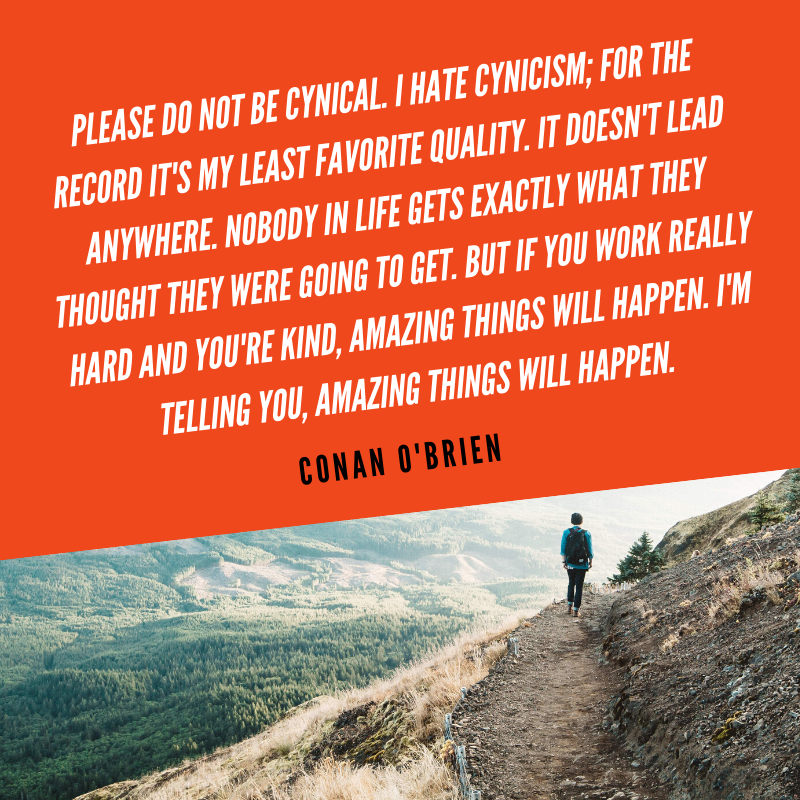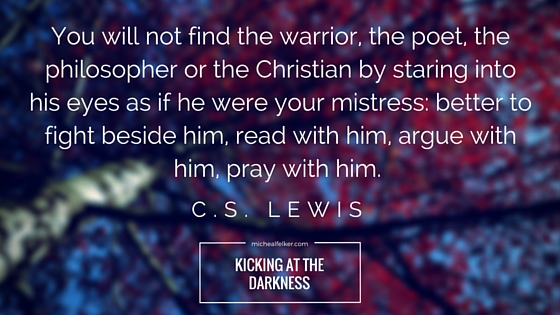In a day and age where you can “cancel” someone or an organization because you disagree with them or “unfollow” both life-long friends and digital friends once the relationship gets bumpy, criticism and cynicism can easily take root in our hearts spilling over into every area of our lives.
I had an opportunity to hear Rob Bell speak last night in a small venue with a hundred or so other people. The topic: An Introduction to Joy.
If you have ever hear Rob speak in person you know that his presence and delivery radiant a certain joy and wonder as unfolds his ideas and thoughts in a kind of structured steam-of-consciousness. In what you could call part comedy act and part spiritual rumination, Bell took the audience on a journey to embrace joy whether you find yourself facing the mundane of your everyday experience or find yourself holding on for dear life with the maelstrom hits.
Early in his presentation he “called-out” Cynicism for what it really is. He said, “Cynicism is easy. Cynicism is lazy.” It is so easy to dip ones toes in the shallow end of complaint over poor service at the coffee shop or how this artist who produced once great art has sold out. It is lazy to not really engage with something or someone because they seem beneath you or don’t tow your party line.
It is a very small drift from “This thing is bad” to “Everything is bad.” Cynicism, once introduced into the ecosystem of your life, wreaks kudzu level damage as it overtakes everything including the ability to truly live life in the moment and find joy in the various aspects of the human experience. Bell does not call for disingenuous praise or naïveté or ignorance of people, events, or circumstances that are deserving of complaint. Instead, Bell calls for a conscious decision to be made ahead of time to choose Joy, to choose Wonder, to choose Life in the here and now… because now is all we really have.
Bell, who himself has been “cancelled” in many of the same circles that once embraced him, spoke about how Joy is big enough to wrap itself around both Happy and Sad and strong enough to navigate both Triumph and Tragedy. As he spoke I could not help but think about the person who first spoke to my heart and opened my to the dangers of cynicism: Conan O’Brien.
In 2004, NBC Execs announced that Jay Leno would retire after 17 years of hosting the Tonight Show. Conan O’Brien would be his successor and in 2009 the transition happened. However, in less than 6 months there were talks of moving Leno back to that time slot and bumping the Tonight Show to five minutes into tomorrow.
Conan walked.
On his last show, as his final goodbye, he said this…
“Please do not be cynical. I hate cynicism; for the record it’s my least favorite quality. It doesn’t lead anywhere. Nobody in life gets exactly what they thought they were going to get. But if you work really hard and you’re kind, amazing things will happen. I’m telling you, amazing things will happen.”
If anyone had the opportunity and the right to be cynical in that moment it was Conan. Years of hard work behind the scenes writing, years of capital built up in front of the camera, leading a staff of hundreds from New York to LA with the promise of bigger and better things only to be yanked around and ultimately dismissed, and by all accounts, years of building a reputation of being a genuinely nice person in this moment seemed to not about to a hill of beans.
But this was Conan’s hill… and these were his beans.
In that moment, and it seems the moments since, Conan has chosen to fight against cynicism and embraced both the difficult and amazing things that have happened to him.
And I think that’s the key… Choice.
You don’t always get the choice concerning what happens to you… Where you were born, how tall you are, that car accident, that time you got downsized, etc.
But, more often than not, you do get to choose how you will respond to the things that happen to you.
This takes some cultivation and some time to develop though. Tomorrow I’ll introduce you to a man who faced some incredible hardships but found a way to both face the reality of bad and choose joy in moving forward.
Question:
What have you become cynical about lately? How has that cynicism affected not just how you view that thing, event, or person but how you view everything else around you?
What brings you joy?





